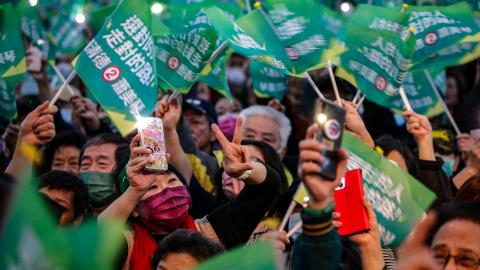This week, the citizens of the Republic of China, also known as Taiwan, will vote for their next president. Like America, this exercise in democracy happens every four years. Presidential elections, in Taiwan and elsewhere, have a greater focus on foreign policy than just domestic politics. And just like America, Taiwan’s biggest foreign policy issue is the military and economic challenges created by the People’s Republic of China.
The next administration in Taipei will decide whether to embrace the policies of Taiwan’s current president, Tsai Ing-wen, which includes building deeper relationships with America, Europe, Japan, and others across the Indo-Pacific. The alternative presented by the opposition includes taking the spotlight off U.S.-Taiwan relations and restarting past economic and cultural exchanges between Taipei and Beijing.
Taiwanese voters will decide which future they want — one that continues to embrace an America-forward foreign policy or one that attempts to rekindle a relationship with China. But it’s important for Americans watching the election to not see this dichotomy as Taiwan moving either anti-China or anti-America. Both the U.S. and China will remain important in Taiwan politics. And whichever party wins, China will remain the greatest threat to Taiwan’s future.
Taiwan’s presidential candidates recognize that Beijing has not abandoned its plan to subjugate Taiwan, either through peaceful means or by force. China’s leader, Xi Jinping, repeated this sentiment to President Biden recently. However, the difference between Taiwan’s presidential candidates is how they think Taiwan should respond to this threat.
The presidential race is currently between three candidates. Vice President Lai Ching-te, who also goes by his English name, William Lai, is the incumbent, running for the Democratic People’s Party (DPP). As vice president, his platform includes building on Taiwan’s relationship with its greatest democratic partner, America. It should come as no surprise that his choice for vice president has been Taiwan’s representative in Washington for the past several years.
The other candidates are Hou Yu-ih of the Kuomintang (KMT) Party and Ko Wen-je of the Taiwan People’s Party (TPP). Their positions are not to abandon U.S.-Taiwan relations but that Taiwan’s foreign policy, and economic future, intersect through China. They believe that restarting economic and cultural dialogues with Beijing will offer opportunities for trade, job growth, and wage growth in Taiwan. But all three parties recognize the need to continue working with America to build up Taiwan’s military deterrence against China’s army.
The difficulty candidates will find in crafting their foreign policies is that diplomatic efforts mean little if the other party isn’t willing to negotiate. This means that if the DPP wins, Taiwan’s progress in trade negotiations with Washington is still limited by how much Washington is willing to budge. There is still hope among U.S.-Taiwan experts for a future bilateral trade agreement. But policymakers in Washington still have their limits and trade remains highly contentious inside the beltway.
Vice versa, the opposition parties’ efforts will go only as far as Beijing is willing to resume dialogues. Beijing may be desperate for Taiwanese trade, investment, and talent as its economy stumbles. But it is also likely that Beijing will continue down a path of belligerent diplomacy across the Indo-Pacific. Beijing may very well continue to send daily military aircraft, ships, and balloons around Taiwan.
Washington policymakers will have to adjust accordingly to whichever party wins. If either opposition candidate wins, we can expect to see far fewer U.S. lawmakers welcomed to Taipei. This is certainly true for the Speaker of the House of Representatives. Also expect to hear less from the various dialogues between the U.S. and Taiwan, such as those held either through the State Department, Commerce Department, or U.S. Trade Representative’s Office. These efforts will remain ongoing, but Taipei’s new leadership will want to minimize the publicity around their progress.
Meanwhile, if the incumbent DPP party wins, they’ll continue with ongoing trade and investment efforts between Taipei and Washington. But they may even expect more, such as progress on a bilateral tax agreement or America’s support for Taiwan to join the Trans-Pacific Partnership — even though the U.S. is not a member of the trade agreement. Taipei will also look to expand dialogues with other partners around the world in an effort to combat years of Beijing’s efforts to internationally isolate Taiwan.
It is hard to predict exactly how China will respond to either a KMT or TPP victory. But it is expected that Beijing will respond poorly to a DPP victory — just as it did in 2016 and 2020 — with a possible military show-of-force and trade restrictions. Ironically, it’s China’s impulsive reaction to Taiwan’s election that will further encourage American and international support for Taiwan.
Whoever wins, it is important to remember this is the will of the people of Taiwan. America should continue to offer its support to Taiwan, which remains an important beacon for democracy in Asia and a strong economic and technology partner of the U.S.


















